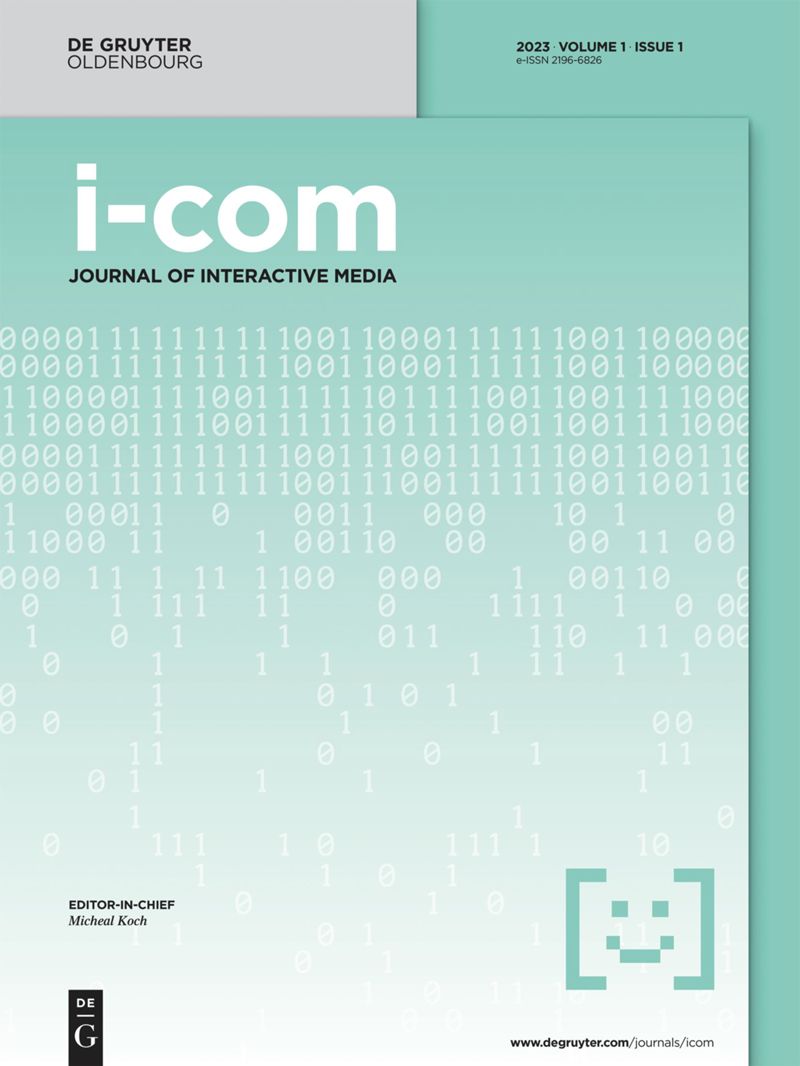 Call for Papers: Journal of Interactive Media (i-com)
Call for Papers: Journal of Interactive Media (i-com)
See also: https://i-com-journal.org/special-issue-on-usable-safety-and-security/
Special Issue on “Usable Safety and Security”
Local disasters such as the Ahr Valley flood in Germany, the international consequences of the Russian invasion of Ukraine, the global COVID-19 pandemic, the long-term effects of biodiversity loss and climate change, as well as numerous conflicts and crises worldwide place high demands on the people and organisations that are involved in these situations and contexts to save lives, mitigate damage, provide comfort, or organise reconstruction.
Although computer-based solutions have become indispensable, new technologies are constantly making their way into everyday life, such as big data and its analysis with artificial intelligence, the Internet of Things (IoT) and the development of disruption-tolerant networks, or the development of so-called digital twins in virtual reality, whose adaptation, acceptance, usability, usefulness, and legal framework conditions for safety-critical systems must be researched and tested thoroughly.
These technologies also pose new challenges and problems for people and organisations in safety-critical situations, which must be considered in both research and practice. While social media, for example, can help to mobilise volunteers and improve situational awareness, inconsistent and incorrect information, the flood of information in large-scale emergencies, uncoordinated activities and a lack of financial and human resources can increase the complexity of tasks for organisations.
In this special issue, we invite contributions that investigate the use of computer-based solutions in areas and situations of direct relevance to people’s lives and well-being (Usable Safety), as well as contributions to user-oriented concepts of the resilience of sociotechnical systems concerning potential attacks (Usable Security). Possible topics include but are not limited to:
- Usability and user experience in safety-critical contexts (e.g. cybersecurity, healthcare, crisis management, process management, traffic management)
- Case studies and evaluations on usable safety or usable security in different target groups (e.g., authorities, citizens, enterprises, or emergency organisations)
- Algorithms and systems for user-centred and comprehensible big data analytics (e.g. artificial intelligence, visual analytics) in the context of safety-critical human-computer interaction
- Resilience and training in crises, disasters, and conflicts (including resilience, population warning, first aid, extended reality, recommendations for action, and emergency prevention)
- Participation and social media (including neighbourhood and self-help, crowdsourcing, digital volunteers, virtual operations support teams, and crisis mapping)
- Ethical, legal, and social implications in safety-critical systems (e.g., inclusive and ability-based design, value-sensitive design)
- Methods and tools for modelling and validating usable safety and security in sociotechnical systems (e.g. cyber-physical systems, human-robot collaboration, or digital twins)
- Sustainable human-machine-environment interaction in safety-critical contexts (e.g., limiting biodiversity loss, adapting to, and mitigating global warming).
We welcome a broad range of contribution types, such as systematisation of knowledge (survey) research, conceptual and methodological research, qualitative and quantitative empirical research, and design and evaluation research.
Deadlines
- 31.10.2024 30.11.2024: Deadline for Submission
- 31.01.2025: First Round Notifications
- 28.02.2025: Deadline for Revisions
- 07.03.2025: Final Decision
- 19.03.2025: Camera-ready Submission
- Publication scheduled: April 2025
Submission
All submissions must be in English and should represent the original work of the authors with a length of 5.000-10.000 words. Reviewers will be instructed to weigh the contribution of a paper relative to its length if the provided word limit is exceeded. Improved versions of papers previously published in conference proceedings are welcome, provided that no copyright limitations exist.
For information about how to submit manuscripts, see https://i-com-journal.org/calls/ – Regarding Article Processing Fees, the publisher is calling for published articles: We have some sponsoring for this available – so if your institution does not pay for APCs in Golden Open Access journals, do not hesitate to contact the Editor in Chief – We will find a way to cover the costs.
Guest Editors
- Marc-André Kaufhold (Technical University of Darmstadt)
- Tilo Mentler (Trier University of Applied Sciences)
- Simon Nestler (Technical University Ingolstadt of Applied Sciences)
- Christian Reuter (Technical University of Darmstadt)
